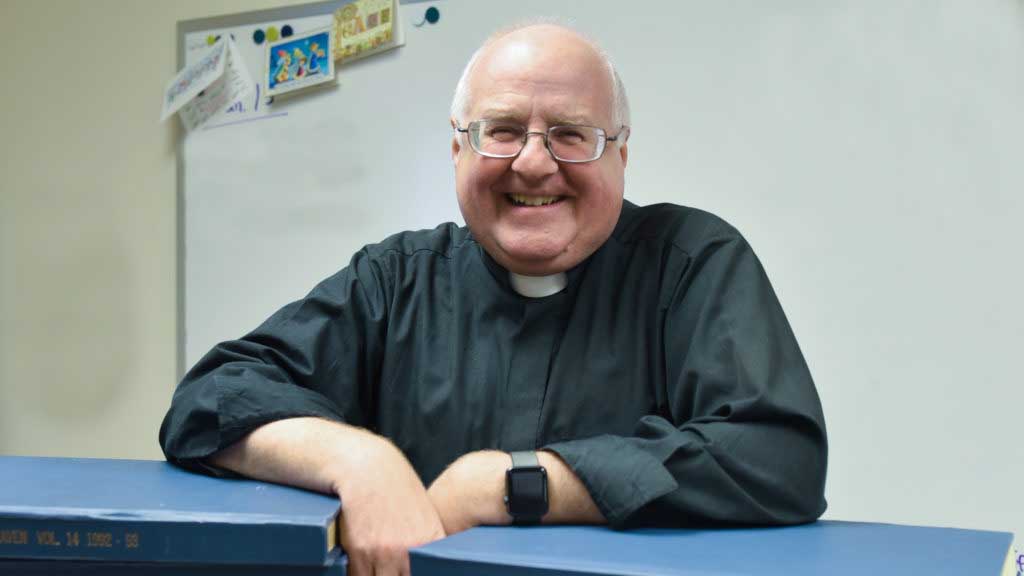
by Father Mark Goldasich
A while back, I saw a Facebook post from someone I knew to be a lifelong Catholic. She was now attending a non-Catholic church, a place “where they teach from the Bible.”
Wow. Perhaps it’s attitudes like this that prompted Pope Francis in 2019 to declare that “the Third Sunday in Ordinary Time is to be devoted to the celebration, study and dissemination of the word of God. . . . A day devoted to the Bible should not be seen as a yearly event but rather a yearlong event, for we urgently need to grow in our knowledge and love of the Scriptures and of the risen Lord, who continues to speak his word and to break bread in the community of believers.”
I’m not sure what that woman’s Facebook post meant since our Mass, baptisms and penance services, for example, are filled with readings from the Bible. If, however, she’s saying many Catholics are not immersed in or comfortable praying with the Bible on their own, I can see her point.
That’s what Pope Francis is getting at with this Sunday of the Word of God, celebrated this year on Jan. 21. I’m encouraged that many parishes offer Bible studies to help people better understand the Scriptures and their place in our prayer life.
It reminds me of the story about a man walking in the desert who heard a voice that said, “Pick up some pebbles; put them in your pocket, and tomorrow you will be both sorry and glad.”
The guy picks up a handful of pebbles and puts them in his pocket. The next morning, he reaches into his pocket to find diamonds, rubies and emeralds. He was both glad and sorry: Glad he’d picked up some pebbles; sorry he hadn’t picked up more.
And so, too, it is with the word of God. (Story adapted from Father Brian Cavanaugh’s “Sower’s Seeds of Encouragement: Fifth Planting.”)
To ensure that you don’t miss out on the treasures in the Bible, here are a few suggestions for making the Scriptures a part of your daily prayer routine.
First, check which translation of the Bible you’re using. Some older Catholic versions were cumbersome to read. It might be time to buy a new one.
Two of my favorites are the Little Rock Catholic Study Bible that is chock-full of maps, notes of key words and many helpful explanations to guide folks in understanding what they’re reading. For those interested in “lectio divina” — a prayerful way to read a passage in the Bible, reflect on it, pray with it and then act on it — get The Catholic Prayer Bible Lectio Divina Edition that guides readers in this style of prayer. Both are found on Amazon and likely wherever Catholic books are sold.
For those who want a simpler way to use the Bible to pray, check out these two resources which offer an abbreviated Liturgy of the Hours. “Daily Prayer 2024” from Liturgy Training Publications (www.LTP.org or 1 (800) 933-1800) is a one-volume prayerbook for each day of this year, with a psalm, one of the daily readings, a reflection, prayers of petition and a closing prayer. “Give Us This Day” (www.giveusthisday.org or 1 (888) 259-8470) is a monthly publication that includes morning and evening prayer, some artwork, the complete daily readings, a saint of the day and reflection on the readings, and prayers of petition.
Of course, you can always check out the weekly readings to the left of this column. If you don’t have a Bible, then go to the U.S. bishops’ website at: www.usccb.org where you’ll find those daily readings and other resources as well.
Let’s make this new year a time to gather up some of those special pebbles each day — the more, the better!


Fr. Mark,
Thank you for this interesting article. It has long been the mission of Liturgical Press to cultivate and amplify texts and voices that deepen the faith and knowledge of a richly diverse Church. Little Rock Catholic Study Bible (https://litpress.org/Products/3649/Little-Rock-Catholic-Study-Bible) and Give Us This Day (https://giveusthisday.org/sample/#mybook/) are two resources we publish that help us fulfill that mission. Request a free sample of a Give Us This Day issue by following the link above.
Blessings and peace.